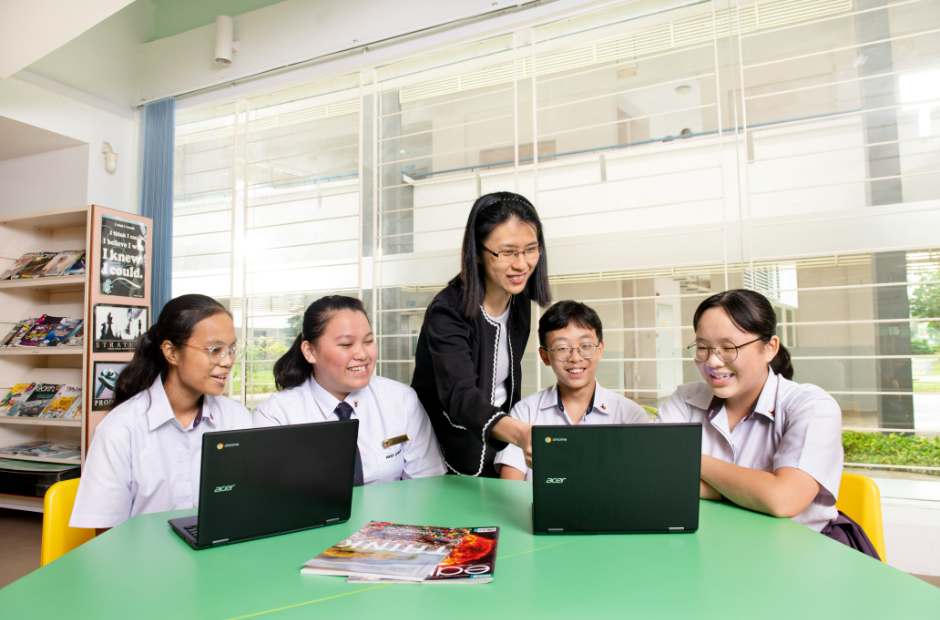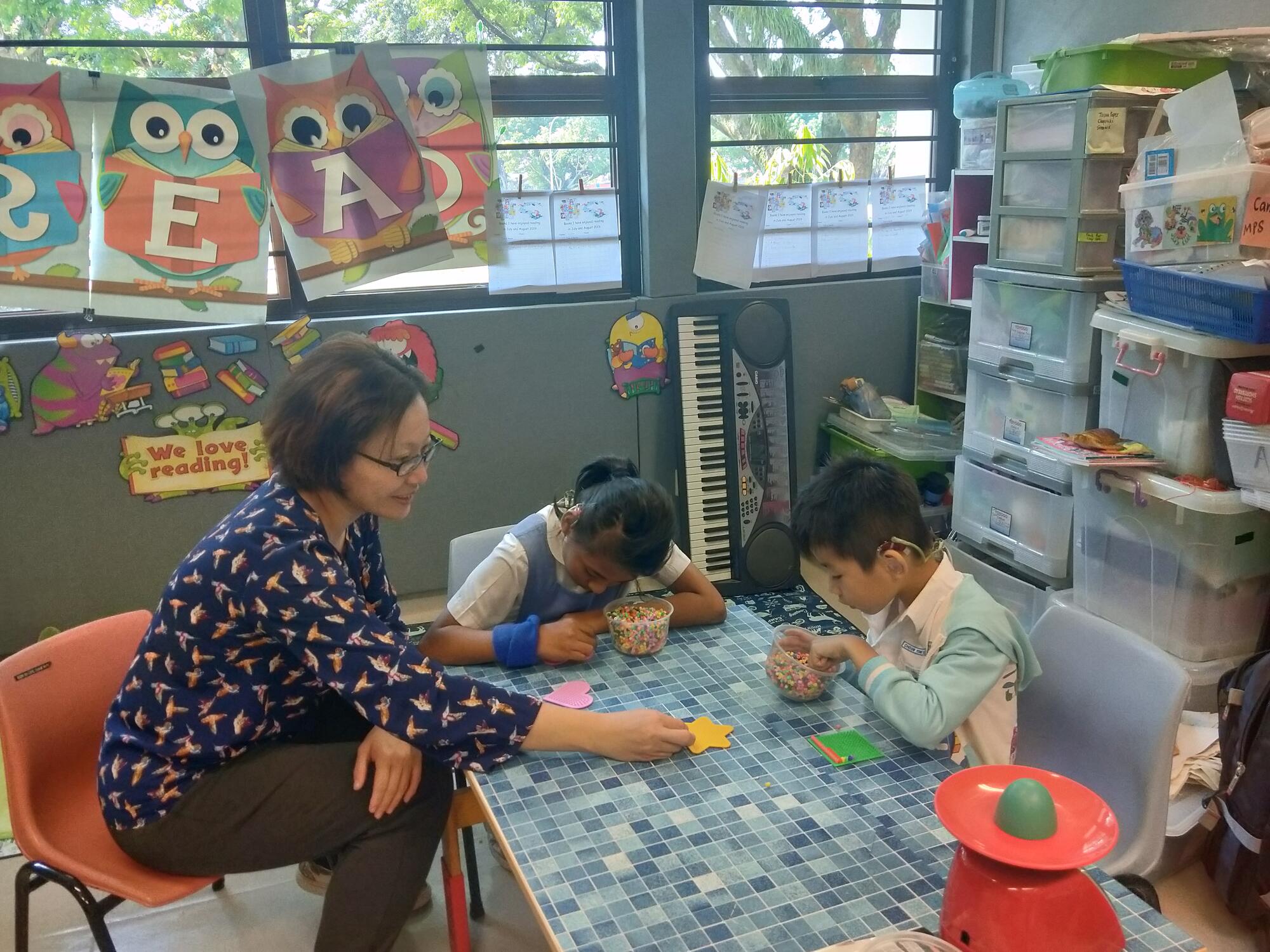It’s the middle of the school day at West Spring Secondary School. The bell rings to signal the end of another lesson, but in Mdm Tan Pin Yin’s class, no one stirs. All eyes are fixed on the screen, watching the unfolding plot of a popular Korean drama.
“Mdm Tan, please don’t stop the video. Why is our Chinese period so short? Can we watch for a few more minutes, just five more minutes?” the students pleaded as their teacher prepared to end her lesson.
Chinese lessons have not morphed into Korean language classes at the school. What the students were watching was a dubbed-in-Mandarin version of a K-drama snippet, which was part of Mdm Tan’s meticulously crafted curriculum to level up their Chinese language skills. In another activity ‘I am a star screenwriter’, students had to come up with their own script endings of yet another K-drama by utilising the vocabulary and essay-writing techniques they had learnt in class. It was a task which they dove into with much zeal and delight.
“You’ll be amazed by their level of engagement and creativity. They came up with storylines beyond my imagination. I remember thinking, wow, I never expected this student to write like that,” Mdm Tan recalls.
Drama serials aside, Mdm Tan injects real-life content such as news programmes, Mandarin pop songs, social media posts, and TikTok videos, to bring the Chinese language to life. The difference is, she intentionally embeds linguistic concepts and values to help students build language skills, and draw connections to what they are learning from their textbooks.
Technology allows for active learning to take place. With clear focus and good scaffolding, lots of encouragement and the correct use of EdTech tools, I can make learning Chinese fun for all students.
Mdm Tan
Rebooting the way Chinese is learnt with EdTech
In an emerging trend of English-speaking families, Mdm Tan is aware of the challenges her students face when learning Mandarin, which may feel like a daunting mountain to climb as many lacked confidence in the language. For that reason, she constantly pushes her own boundaries, exploring new ways of curriculum delivery to plug their learning gaps.
The advent of educational technology, or EdTech, has changed the game for her. She enthuses, “Technology allows for active learning to take place. With clear focus and good scaffolding, lots of encouragement and the correct use of EdTech tools, I can make learning Chinese fun for all students.”
In 2017, Mdm Tan had the chance to fuse EdTech with language practice when she participated in MOE’s Educational Technology Division (ETD) Chinese Language Design Challenge for teachers. Over a rigorous three-month period, she paired tried-and-tested pedagogy (such as writing strategies) and thinking routines with an assortment of ICT (InfoComm Technology) tools like Padlet, Mentimeter, Google Doc and Google Classroom.
To teach argumentative essay techniques, for example, students got together in groups to research online, argue points among themselves and write up their essays using online tools, before presenting their arguments to the class. Feedback from her and their peers was given on the spot, making the process far more dynamic than how the lesson was traditionally taught – through memorisation, drill and practice. “If I use the drill and practice way, it will not promote the joy of learning. They would continue to be disengaged with the language,” she reasons.
Mdm Tan has amply demonstrated how such blended learning can both engage and educate in the context of today’s classroom.
The experience cemented her belief that ICT should be an integral part of learning. She went on to share her insights with fellow educators beyond the teaching of Mother Tongue languages, through multiple platforms, such as school-based training sessions and open classrooms.

It’s the teacher, not the tech
While students, as young digital natives, effortlessly embrace ICT tools, Mdm Tan notes that the same might not be true for teachers who are more used to traditional ways of instruction. As a relatively early adopter and practitioner herself, the educator of 29 years tries to empower her fellow educators to explore and utilise EdTech just as she has done.
To ease them in, she conceptualised and spearheaded iGrow, a professional development model for educators. Offering a structured approach in ICT adoption, iGrow guides teachers on how to choose the right ICT tools and ways to infuse ICT into lesson plans while meeting curriculum goals. In the hope that her fellow educators will embrace the growth mindset in the adoption of e-pedagogy, she even designed a flourishing tree as the emblem for the model.
While she may come across as an EdTech evangelist, Mdm Tan remains conscious that technology cannot replace good teaching.
A teacher is best-placed to spot the students’ learning gaps, for example, or to build soft skills such as teamwork, she says; technology is more of an enabler to better fix these issues, and part of a range of tools that teachers have at their disposal, much like the cartoon character Doraemon’s bag of tricks.
“There should be nothing wrong if a simple whiteboard or Powerpoint presentation is enough for achieving the desired learning objective,” she says.
“I always tell other teachers or remind myself – don’t use technology for the sake of using it. We should make informed decisions, so there’s no need to have many ICT tools. After all, it is us teachers who deliver the lesson, not the technology.”
It is ultimately values and not technology that will help her students navigate a V.U.C.A. (or Volatile, Uncertain, Complex and Ambiguous) future. She faced her own academic hill when she was a young teacher who wasn’t effective at classroom management, so she dug in her heels to brush up on her skills.
It took hard work, time and a lot of perseverance, but it paid off as she has since completed her Master’s degree in Education, specialising in Curriculum and Teaching, and received the accolade of the Inspiring Chinese Language Teacher Award along the way, an honour she cherishes deeply.
“As teachers, we won’t always be there to help our students after they leave school, so they have to learn to be independent and emotionally strong to overcome challenges on their own.”




.jpg)

.jpg)